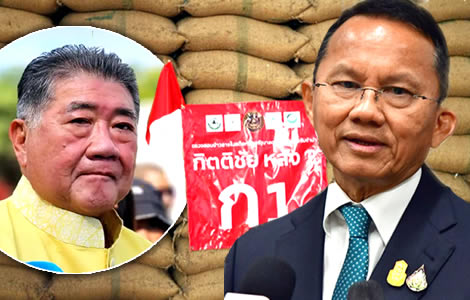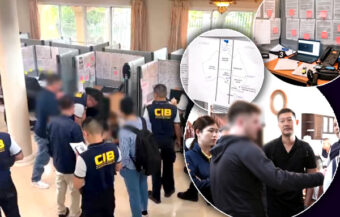Rice Crisis causes the Public Health Minister to intervene in the 10-year-old stockpile disposal controversy. Minister of Public Health Somsak Thepsutin steps in as 10-year-old rice testing sparks uproar. Amid safety fears and export market doubts, officials face a public backlash over auction plans. Deputy Prime Minister Phumtham Wechayachai even threatened legal action against critics.
Minister of Public Health Somsak Thepsutin has stepped into a major controversy over 10-year-old Thai rice. On Wednesday, the minister revealed that the Department of Medical Sciences was currently testing rice samples from 10-year-old stockpiles linked with the country’s disastrous rice-pledging scheme, which ended in 2014. It comes as Deputy Prime Minister and Minister of Commerce Phumtham Wechayachai this week threatened legal action against critics of his scheme to sell the rice, in particular to Africa. Scientists, whistleblowers, and consumer rights groups have warned that the 10-year-old rice is a health hazard. In addition, it could undermine confidence both in Thailand’s rice sold on export markets and indeed in the food served at home due to public unease.

Thailand’s Minister of Public Health Somsak Thepsutin on Wednesday revealed that the Department of Medical Sciences would test samples from Thailand’s 10-year rice pledging stockpile.
It follows a rising chorus of concern raised about plans by the Ministry of Commerce to auction off the remnants of a stockpile created under the disastrous rice-pledging scheme.
The 2011 to 2014 rice intervention scheme by the Yingluck Shinawatra-led Pheu Thai government led to the loss of ฿500 billion.
Rice pledging disaster was a catalyst for the 2014 protests which ultimately unseated the government after a coup d’état was launched by Prayut Chan Ocha
Indeed, it was a key catalyst for organised protests against the government in 2014, which ultimately led to the coup d’état. The coup was led by former Prime Minister General Prayut Chan Ocha.
Afterwards, the controversy saw officials, including ministers, jailed by the courts with long prison terms. In addition, former Prime Minister Yingluck herself was sentenced to 5 years in absentia after she fled the country.
She was convicted of malfeasance and neglect of duty under Section 157 of the Criminal Code for failing to guard or supervise bogus government-to-government rice sales under the scheme.
Analysts in 2024 see a clear parallel between the rice-pledging scheme and Pheu Thai’s Digital Wallet proposal. Both plans were designed to prime the economy while being susceptible to abuse and fraud.
Indeed, this is not political posturing, many who have warned Pheu Thai about the scheme are former supporters and pro-democracy activists.
General Prayut’s government disposed of rice in the scheme for ฿146 billion in 2018, a significant achievement at that time. This offering is far smaller
Ultimately, the scheme left 18.6 million tons of rice in government-controlled warehouses. However, in September 2018, the government of Prayut Chan-o-cha managed to offload nearly 96% of the stock. In short, 17.8 million tons were sold for ฿146 billion.
Clearly, this was a significant achievement and equivalent roughly to the export value of Thai rice in 2023 in a strong market.
Sobering news for new Pheu Thai ministers as economic growth rate continues to weaken
Central bank boss worried about General Election political promises and rising geopolitical threats
Corruption over the rice-pledging scheme cost Thai taxpayers ฿230 billion and caused hardship
At this time, Deputy Prime Minister and Minister of Commerce Phumtham Wechayachai is striving to raise just ฿270 million in an auction for the remaining stock. Somewhere in the region of 4% of the original stockpile.
The minister says he is seeking to obtain value for state assets while also saving ฿380,000 per month in storage costs.
Plan has proved disastrous so far, sparking controversy and a media firestorm. Coverage threatens to damage Thailand’s reputation as a top rice exporter
Nonetheless, the plan has proved disastrous. In short, it has sparked controversy over the safety of the rice.
In turn, the negative press and media publicity are threatening to undermine market confidence in Thailand’s rice exports, which represent 1.5% of the country’s output.
Even more concerning is the reaction of the deputy prime minister to the questions asked. This week, he threatened to have government agencies take legal action against anyone peddling false or spurious information which may damage the country’s export crop.
However, there has already been a perceptive shift in the government’s position.
Last week, the prime minister was photographed at Government House eating specially cooked stored rice. He assured the media it was delicious.
Prime Minister Srettha Thavisin calls for the rice in storage to be tested scientifically. Meanwhile, the Minister of Defence assured military personnel
Afterwards, however, he called for the proposed stock to be scientifically tested for safety. In recent days, Minister of Defence Sutin Klangsaeng, speaking to military personnel, assured them that rice supplied to them would be new and fresh.
Previously, there had been some discussion of supplying the stored rice to the military. Undoubtedly, this was highly embarrassing for the government.
Nonetheless, there is certainly validity to the concerns.
It appears the problem for Deputy Prime Minister Phumtham is political inferences have been wrongly made about the motivation behind his efforts. In short, he seeks to bring an end to the disastrous story of the rice pledging saga.
Organic chemistry expert claims that rice samples taken from the depot where Minister Phumtam ate last Thursday were tested and showed toxic contamination
Mr Weerachai Phutdhawong is among those who have provoked the minister’s ire. In short, he is an organic chemistry expert.
In recent days, he asked the media and reporters to test samples reportedly taken from a government warehouse in Surin province.
These were in the Mueang and Prasat districts of the lower northeast province which Minister Phumtham visited last Thursday.
Before the media, he and his entourage ate the rice stored there.
Nonetheless, Mr Weerachai claims that samples of the rice found there contain aflatoxins. These are caused by repeated fumigations under dry storage of the crop over a long time frame. Undoubtedly, 10 years is a particularly long time.
Aflatoxins have been linked by medical experts with a risk of liver cancer.
Arch critic of the original rice-pledging scheme came forward to criticise the plan. Deputy Prime Minister Phumatam challenged him to prove his claims
At the same time, another critic was a whistleblower of the 2014 Pheu Thai rice-pledging scheme.
Dr Warong Dechgitvigrom is a chief adviser to the Thai Pakdee Party. Previously, Dr Warong, a doctor, founded the party in 2021. The party is now aligned with the Democrat Party and focused on supporting the monarchy.
Dr Warong questioned the sellability of the old rice at this point.
In response, the deputy prime minister was furious.
‘Checks were conducted on the rice in a transparent manner. The rice is fit for auction. The old rice does not necessarily have the same pleasant smell as new crops. The rice will be exported to Africa,’ Mr Phumtham fumed. ‘I want to challenge Dr Warong to prove (his claims). If it turns out to be fine, however, Dr Warong must take responsibility.’
Speaking offhand with reporters, this week, Deputy Prime Minister Phumtam insisted that he was not angry. Certainly, he was sincere and felt strongly about his mission to dispose of the rice.
Plan to auction the rice in two to three weeks’ time
He claims that tests had already been carried out on the rice and that it was deemed fit for auction.
In short, the Commerce Ministry plans to auction the state-owned enterprise’s rice in a period from the end of May into early June.
Contract bidders will be checked and verified, and any bid must lead to a contract within 15 days.
Meanwhile, in the aftermath of this controversy, the Prime Minister’s Office is understood to have ordered definitive testing. In brief, Prime Minister Srettha Thavisin stressed the need for lab tests confirming the safety of the rice.
In the meantime, critics of the plan are urging the government to see the rice disposed of, primarily for use in alcohol distillation rather than human consumption.
Public confidence disturbed by the furore leading to the involvement of the Thailand Consumers Council (TCC) which says it also found toxins in the rice
Undoubtedly, the resulting furore over the issue has disturbed the public.
It comes with consumer confidence in Thailand falling for the second month. Simultaneously, one of the reasons cited by researchers is public concern about rising instability in politics.
These concerns were voiced this week by the Secretary-General of the Thailand Consumers Council (TCC), Ms Saree Aungsomwang. On Tuesday, she revealed that her organisation had carried out its own tests on rice samples from Surin. These were initial tests carried out by Kasetsart University.
At length, the reason was concern after reading reports of how the rice stored was fumigated with chemicals to kill insects in regular cycles for 10 years. The organisation wanted to be certain it was fit for human consumption.
In brief, these tests showed the presence of aflatoxins in the rice. Subsequently, the Thailand Consumers Council (TCC) wrote to the Ministry of Commerce.
In particular, the body wants to be able to collect further samples. It wants to have further tests carried out to remove any doubt.
‘We have already submitted a letter to the Ministry of Commerce asking it to let our team collect the rice samples for checks,’ Ms Saree revealed. ‘Unfortunately, there has been no response so far.’
All consumers, both in Thailand and worldwide must feel confident in the quality of any Thai rice sold for human consumption says the council boss
Ms Saree said that all consumers in Thailand and anywhere in the world should be assured of the safety of the rice in question. She insisted that in any event, even if the rice is deemed safe, it should carry a warning to customers everywhere.
This follows concerns within the wider industry among national rice traders.
In truth, there are reports of poor-quality rice being mixed with new rice in certain consumer products. The unease is caused by the presence of rice-pledging warehouses across the kingdom.
In the meantime, on Wednesday, Minister Somsak Thepsutin wanted to assure the public. He promised that tests on the rice were in progress.
In short, he assured reporters they would have results sometime over the weekend or possibly even Friday.
Public Health minister guarantees the public that newly ordered Department of Medical Sciences tests on the stored rice will be valid and accurate
The Public Health Minister said he had ordered the tests himself to satisfy his own concerns.
Significantly, he underlined that the results of the tests in government laboratories would be relayed directly to the public.
Minister Somsak said he did not know much about rice himself. Nor was he a scientific expert; therefore, he was loath to speculate on the possible result.
At the same time, he was careful to stress that this was a critically important issue and that there was no room for obfuscation.
‘I ask people not to worry about inspections. Because government agencies cannot make mistakes. They must be accurate. If they are not accurate, things will get difficult. The government service has not been compromised. You may rest at ease. May we respect each other. If we don’t respect each other, who will come to help us next? The bureaucracy has to get it right. There is no left or right turn. Please be at ease,’ he told reporters.
Thailand is the second biggest world exporter of rice with 13.5% of the market. India, however, has 38.8%.
Rice exports from Thailand worth up to ฿150 billion in 2023 but there are concerns this year that El Nino-driven drought conditions may hamper crop output
Certainly, the importance of rice even to a country like Thailand is not primarily for exports. It is food security. Only 11% of rice produced worldwide is exported.
At the same time, this year the kingdom is facing stiff competition from an array of other producers. This includes Vietnam, Pakistan and China.
In addition, the effects of El Niño combined with climate change may hamper rice output for the year. This all depends on rainfall in the months ahead.
Nonetheless, Thailand’s rice exports in 2023 were worth between ฿140 and ฿150 billion. This was up from ฿138 billion in 2022.
The key export markets for rice are the Middle East, Africa, and other Asian countries.
However, Thailand exports over 42% of the rice imported by the United States, a premium market. Hence the need to protect the quality and reputation of one of Thailand’s key exports.
Join the Thai News forum, follow Thai Examiner on Facebook here
Receive all our stories as they come out on Telegram here
Follow Thai Examiner here
Further reading:
Economy unlikely to grow in first quarter as Thai manufacturing crumbles. Hard choices ahead
New Finance Minister expected in April as economic malaise deepens with downgrades in GDP growth
Digital Wallet plan blown out of the water by corruption body on Tuesday warning of illegality
Economy is in troubled waters with fears for both exports and foreign tourism as 2023 winds down
Thailand faces an economic future of low growth despite Srettha’s plans because of a darker world
Another dip for the baht or are economic danger signals flashing for both Thailand and the world?
Bank of Thailand boss appears critical of the new government’s policy initiatives on the economy


















